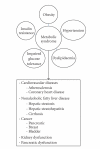Rodent models for metabolic syndrome research
- PMID: 21253582
- PMCID: PMC3018657
- DOI: 10.1155/2011/351982
Rodent models for metabolic syndrome research
Abstract
Rodents are widely used to mimic human diseases to improve understanding of the causes and progression of disease symptoms and to test potential therapeutic interventions. Chronic diseases such as obesity, diabetes and hypertension, together known as the metabolic syndrome, are causing increasing morbidity and mortality. To control these diseases, research in rodent models that closely mimic the changes in humans is essential. This review will examine the adequacy of the many rodent models of metabolic syndrome to mimic the causes and progression of the disease in humans. The primary criterion will be whether a rodent model initiates all of the signs, especially obesity, diabetes, hypertension and dysfunction of the heart, blood vessels, liver and kidney, primarily by diet since these are the diet-induced signs in humans with metabolic syndrome. We conclude that the model that comes closest to fulfilling this criterion is the high carbohydrate, high fat-fed male rodent.
Figures
References
-
- Simmons RK, Alberti KGMM, Gale EAM, et al. The metabolic syndrome: useful concept or clinical tool? Report of a WHO expert consultation. Diabetologia. 2010;53(4):600–605. - PubMed
-
- Bauduceau B, Vachey E, Mayaudon H, et al. Should we have more definitions ofmetabolic syndrome orsimply take waist measurement? Diabetes and Metabolism. 2007;33(5):333–339. - PubMed
-
- Isomaa B, Almgren P, Tuomi T, et al. Cardiovascular morbidity and mortality associated with the metabolic syndrome. Diabetes Care. 2001;24(4):683–689. - PubMed
-
- Lakka HM, Laaksonen DE, Lakka TA, et al. The metabolic syndrome and total and cardiovascular disease mortality in middle-aged men. Journal of the American Medical Association. 2002;288(21):2709–2716. - PubMed
-
- Aschner P. Metabolic syndrome as a risk factor for diabetes. Expert Review of Cardiovascular Therapy. 2010;8(3):407–412. - PubMed
Publication types
MeSH terms
LinkOut - more resources
Full Text Sources
Medical





